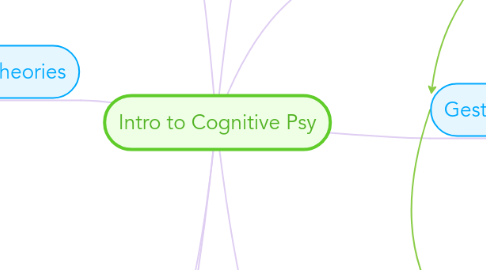Intro to Cognitive Psy
저자: Lee Sher Men


1. Structuralism (what)
1.1. Wilhelm Wundt (the first psychologist)
1.2. Inspired by chemistry (Table of elements)
1.3. How basic units combine -> complex mental phenomena, conscious experience
1.4. Methods of introspection
2. Human factors in WW1&2
2.1. Complex technology & machinery being used in war, need to design for human mind to understand (Shape coding)
2.2. Behaviourism poor fit for this task
3. Modern cognitive science
3.1. Dual-processing theories -Two routes how cognition works
3.2. Cognitive Neuroscience
3.3. Embodied cognition - how body experience affect objective perception of a thing
3.4. Cultural and individual differences
4. Theories
4.1. Human Information Processing vs. Connectionism
4.2. HIP
4.2.1. -Mind is like computer -step by step (stage-based) -central processor -knowledge is processed & stored -symbolic ( recode stimuli into symbols we understand
4.3. Connectionism
4.3.1. Mind=brain -parallel processing(multiple tasks happening at a same time -no central processor -knowledge is not stored but network &connect -no symbolic
5. Functionalism (How & Why)
5.1. William James criticized structuralism
5.2. Functions’ of thought and behaviour
5.3. emphasize on individual differences(education)
6. Behaviourism
6.1. Reaction to structuralism & functionalism
6.2. publicly observable” “external behaviours, Disdained introspection methods/results
6.3. Psychology = Learning Not concerned with mental processes
7. Gestalt
7.1. Rejected structuralism, functionalism, AND behaviourism
7.2. “Whole is more than sum of parts
7.3. inborn ability shapes the way we perceive the world (Mind innately imposes structure to simplify perception)
8. The Cognitive Revolution
8.1. mental events can be studied scientifically
8.2. Mental events affect behaviour
8.3. actively process information Not passive reactors
8.4. Ulric Neisser (father of cognitive psychology)
8.4.1. Critical of behaviourism and strict lab experiments
8.5. Noam Chomsky (Psycholinguistics)
8.5.1. Nativist background (believe in innate ability to pick up structure of language
8.5.2. Criticize skinner's book
8.6. George Miller
8.6.1. Limited capacity of certain mental resources
8.6.2. Mental processes must control some part of behaviour
